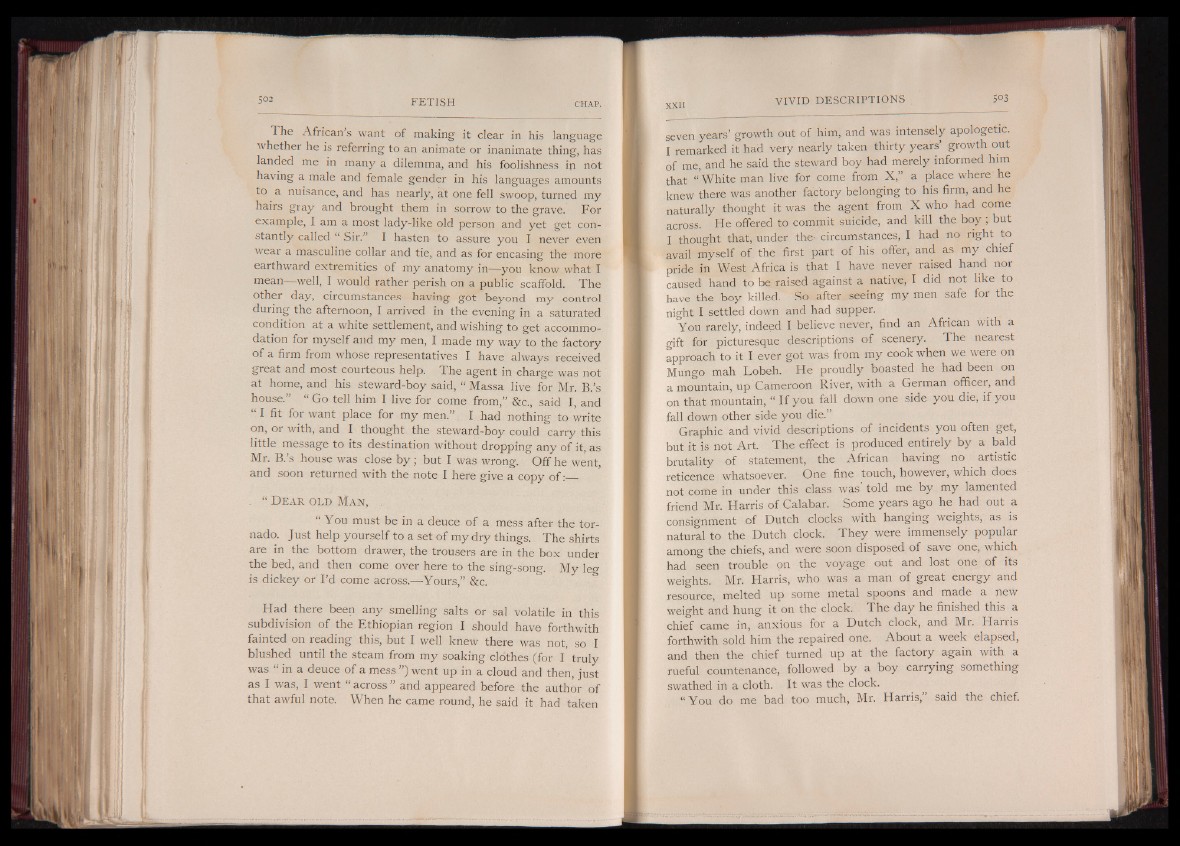
The African s want of making it clear in his language
whether he is referring to an animate or inanimate thing, has
landed me in many a dilemma, and his foolishness in not
having a male and female gender in his languages amounts
to a nuisance, and has nearly, at one fell swoop, turned my
hairs gray and brought them in sorrow to the grave. For
example, I am a most lady-like old person and yet get constantly
called “ Sir.” I hasten to assure you I never even
wear a masculine collar and tie, and as for encasing the more
earthward extremities of my anatomy in— you know what I
mean well, I would rather perish on a public scaffold. The
other day, circumstances having got beyond my control
during the afternoon, I arrived in the evening in a saturated
condition at a white settlement, and wishing to get accommodation
for myself and my men, I made my way to the factory
of a firm from whose representatives I have always received
great and most courteous help. The agent in charge was not
at home, and his steward-boy said, “ Massa live for Mr. B.’s
house.” “ Go tell him I live for come from,” &c., said I, and
I fit for want place for my men.” I had nothing to write
on, or with, and I thought the steward-boy could carry this
little message to its destination without dropping any of it, as
Mr. B.’s house was close by ; but I was wrong. Off he went,
and soon returned with the note I here give a copy of:_
“ D e a r o l d M a n , .
“ You must be in a deuce of a mess after the tornado.
Just help yourself to a set of my dry things. The shirts
are in the bottom drawer, the trousers are in the box under
the bed, and then come over here to the sing-song. My leg
is dickey or I’d come across.— Yours,” &c.
Had there been any smelling salts or sal volatile in this
subdivision of the Ethiopian region I should have forthwith
fainted on reading this, but I well knew there was not, so I
blushed until the steam from my soaking clothes (for I truly
was “ in a deuce of a mess ”) went up in a cloud and then, just
as I was, I went “ across ” and appeared before the author of
that awful note. When he came round, he said it had taken
seven years’ growth out of him, and was intensely apologetic.
I remarked it had very nearly taken thirty years’ growth out
of me, and he said the steward boy had merely informed him
that “ White man live for come from X,” a place where he
knew there was another factory belonging to his firm, and he
naturally thought it was the agent from X who had come
across. He offered to commit suicide, and kill the boy ; but
I thought that, under the- circumstances, I had no right to
avail myself of the first part of his offer, and as my chief
pride in West Africa is that I have never raised hand nor
caused hand to be raised against a native, I did not like to
have the boy killed. So after seeing my men safe for the
night I settled down and had supper.
You rarely, indeed I believe never, find an African with a
gift for picturesque descriptions of scenery. The nearest
approach to it I ever got was from my cook when we were on
Mungo mah Lobeh. He proudly boasted he had been on
a mountain, up Cameroon River, with a German officer, and
on that mountain, “ If you fall down one side you die, if you
fall down other side you die.”
Graphic and vivid descriptions of incidents you often get,
but it is not Art. The effect is produced entirely by a bald
brutality of statement, the African having no artistic
reticence whatsoever. One fine touch, however, which does
not come in under this class was' told me by my lamented
friend Mr. Harris of Calabar. Some years ago he had out a
consignment of Dutch clocks with hanging weights, as is
natural to the Dutch clock. They were immensely popular
among the chiefs, and were soon disposed of save one, which
had seen trouble pn the voyage out and lost one of its
weights. Mr. Harris, who was a man of great energy and
resource, melted up some metal spoons and made a new
weight and hung it on the clock. The day he finished this a
chief came in, anxious for a Dutch clock, and IVCr. Harris
forthwith sold him the repaired one. About a week elapsed,
and then the chief turned up at the factory again with a
rueful countenance, followed by a boy carrying something
swathed in a cloth. It was the clock.
“ You do me bad too much, Mr. Harris, said the chief.